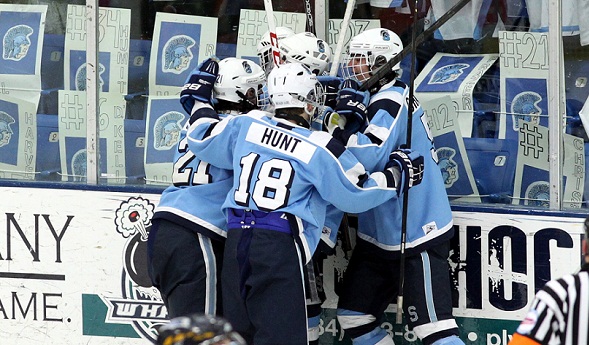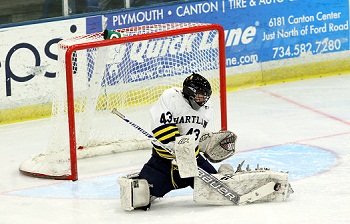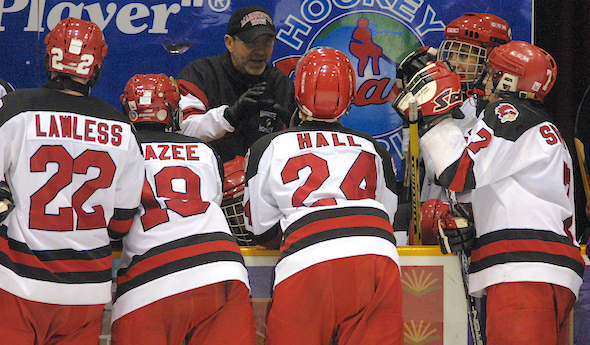
'Team 43' Delivers 1st Livonia Title
March 9, 2013
By Bill Khan
Special to Second Half
PLYMOUTH — Livonia is one of the great hockey communities in Michigan, but had never been home to an MHSAA Finals champion.
Until now.
Livonia Stevenson brought a championship to the birthplace of former NHL star Mike Modano, beating Hartland 5-4 in the Division 2 title game Saturday at Compuware Arena.
Prior to this weekend, Livonia's three hockey-playing schools had combined for only eight regional championships during the 39-year history of the MHSAA tournament and just one semifinal appearance (Stevenson in 1987). It doesn't help that the Livonia schools often encounter some of the state's perennial powerhouses early in the postseason. Stevenson has been eliminated 10 times by Detroit Catholic Central and five times by Trenton in regional play.
"I couldn't be happier for the Stevenson administration, the alumni and the whole Livonia community," fifth-year Stevenson coach David Mitchell said. "We're in the 43rd year of high school hockey in Livonia.
We're the 43rd team in Stevenson history. This is the first chance a Livonia school has had to play in a state final. To get it done, this is not just for Stevenson, but for all of Livonia high school hockey. We've had some great teams and some great kids go through our program. To do it is very special. Hopefully, the whole community can enjoy this."
To win its first championship, Stevenson denied Hartland the same opportunity. The Eagles had won 11 regional titles before this season, reaching the semifinals only twice until playing in their first final on Saturday.
Hartland coach Rick Gadwa praised captains Nick Pleshakov, Justin Bailey and Ned O'Boyle for laying the foundation for Hartland's first march to the championship game.
"These three guys changed Hartland hockey," Gadwa said. "It was their leadership on and off the ice. We put Hartland on the map. That's something that hopefully stays."
Junior Dominic Lutz was the star in Stevenson's historic season, scoring 42 goals with 32 assists in 31 games to easily lead the Spartans in scoring. It was fitting that the 6-foot, 185-pound forward scored the team's biggest goals in the championship game, popping in two in a 2:37 span of the second period to turn a 2-1 deficit into a 3-2 advantage. Stevenson never surrendered the lead.
"We've been preaching Team 43," Lutz said. "It's just great to see it all come together in the end. We've got it. It's unbelievable. We're like a family. This is the closest team I've ever played on."
 Stevenson senior Travis Harvey, who scored two goals and had two assists in the semifinal on Friday, opened the scoring off a faceoff win at 4:55 of the first period. Hartland junior Austin Flores tied it off a
Stevenson senior Travis Harvey, who scored two goals and had two assists in the semifinal on Friday, opened the scoring off a faceoff win at 4:55 of the first period. Hartland junior Austin Flores tied it off a
feed from Chris McRae at 6:26 of the first.
Despite being outplayed in the first period, Hartland found itself on top by a 2-1 count when McRae scored just 54 seconds into the second period.
The pace picked up considerably after that, as the teams combined for five goals during an 8:18 span. Stevenson took the lead for good on two goals by Lutz at 4:30 and 7:07 and Harvey's second goal of the game at
9:10.
O'Boyle brought Hartland within 4-3 at the 9:56 mark, only to have Stevenson regain a two-goal advantage at 12:48 on a goal by Ray Chartier.
"We would rather not play that way," Mitchell said. "We'd rather play a little more defensive and shut things down. These guys, when they see opportunities, they tend to go. We saw a few opportunities and
took some. Give Hartland credit. We were starting to look for goals and they caught us and they turned around and buried some of their own. They played an outstanding game."
"It was just go, go, go," O'Boyle said. "It was incredible emotionally."
Hartland didn't take long to trim the lead once the puck dropped in the third period, making it a 5-4 game on a goal by McRae at the 14-second mark.
The Eagles had eight more shots on net the rest of the game, but couldn't get another puck past Stevenson goalie Connor Humitz. Hartland called timeout with 2:21 left and pulled goalie Nick Wineka in the final minute, but couldn't generate a shot in that time against an aggressive Stevenson forecheck.
"We just want to keep it deep in their zone as much as we can," Lutz said. "Just gain the red line, get it deep and forecheck. We didn't want anything in our zone. We wanted everything down there, just keep
all the pressure off Connor. It seemed like it worked out."
Stevenson finished with a 23-7-1 record, while Hartland ended 19-9-2.
PHOTOS: (Top) Livonia Stevenson players celebrate a goal during Saturday's Division 2 Final in front of their fan section at Compuware Arena. (Middle) Hartland goaltender Nick Wineka makes one of his 35 saves Saturday. (Photos by Hockey Weekly Action Photos.)

#TBT: 2002 Ends with Lights-Out Finals
July 12, 2019
By Rob Kaminski
MHSAA benchmarks editor
The Flint IMA had been to the MHSAA Ice Hockey Finals what Joe Louis Arena was to the Detroit Red Wings since it began hosting high school championships in the state in 1977.
For parts of four decades, the facility set the scene for many memorable moments on ice for scholastic skaters.
So it would have been fitting as the curtain was closing on an era March 9, 2002, if there’d been an overtime championship game or two to commemorate the last MHSAA Finals at the building.
In 2003, the MHSAA Semifinals and Finals would move to Compuware Arena in Plymouth – now USA Hockey Arena – where the event has been played ever since.
There would be no overtimes during the IMA’s swan song, but the arena wasn’t about to let go without a fight. Following the morning’s Division 2 Final, won by Grosse Pointe North over local qualifier Davison, things got strange.
As if by divine intervention, a significant power outage hit the Flint area between the first and second periods of the Division 3 Final, necessitating a return to the building for an encore performance that Monday.
Following is an account from then-MHSAA Assistant Director Randy Allen, administrator of the sport at that time.
 “East Grand Rapids and (Dearborn) Divine Child were between the first and second periods when the power went out at what must’ve been around three in the afternoon. Some of the house lights went on, but there was no huge generator. The power company told us it could be quite a while before the power came back, so the decision was made pretty quickly to come back Monday. (Editor’s Note: MHSAA regulations at that time prohibited Sunday competition, thus play would resume Monday)
“East Grand Rapids and (Dearborn) Divine Child were between the first and second periods when the power went out at what must’ve been around three in the afternoon. Some of the house lights went on, but there was no huge generator. The power company told us it could be quite a while before the power came back, so the decision was made pretty quickly to come back Monday. (Editor’s Note: MHSAA regulations at that time prohibited Sunday competition, thus play would resume Monday)
“Finishing the game in progress Monday was really a no-brainer, but now there were a couple of immediate challenges. First, how were we going to let people know, and second, what was going to happen to the (Detroit) Catholic Central-Marquette Division 1 game coming up later in the day?
“Well, knowing what I knew about the TV business (Allen’s background in Wisconsin included sportscasting), I grabbed one of the television reporters there, probably from Grand Rapids, and asked him to come down to the ice with me. It was totally dark; I figured once he put his camera lights on, it would get the attention of the crowd, which it did. So there’s about 2 or 3 thousand people in the arena – in the dark – and I’m standing in front of a light from a TV camera, and at the top of my voice I explain the situation and let them know we’re coming back Monday.
“Anyone wanting to come back, admission was free of charge, and we’d trust they were at the game. If they wanted a refund, they could mail their ticket stub to MHSAA and we'd send a refund. We obviously couldn’t use the box office without power. I don’t recall more than a couple dozen refund requests coming to our office later.
“Now the real challenge is the Division 1 game. Marquette very, very much wanted to go home and come back a week later. They’d been on the road all week (Marquette won a Quarterfinal in Traverse City that Wednesday). Jack (Roberts, former MHSAA executive director) was there, and he and Marquette’s AD (Scott Koski) and their superintendent debated a bit. In the end, the regulations of the day were upheld, and the game would be Monday.
“As it turned out, someone in the Marquette entourage had a contact in the Detroit Pistons front office, so the team was entertained in a suite at The Palace of Auburn Hills on Sunday night, so that was quite a happy ending from their standpoint.
“Many of the Marquette people were either in the arena or at a single hotel or two in the area, so alerting them to the change was not difficult.
“But then we started to think, ‘What about the Detroit CC people who would be driving up for their game later? Remember, social media was not as prevalent as it is today, or even the dependence on the internet.
“So, Saturday night, I sat there at the entrance to the IMA with my car running and lights on to inform the CC fans and anyone else who pulled up that the game had changed ... ‘Power’s out; game’s on Monday.’ They'd say thanks, and out they'd go. No one really got angry; there wasn’t anything anyone could do. I sat there an hour and a half with a steady stream, and shortly after the scheduled game time I called it a night.”
And, the IMA called it the end of an era, but not before hanging on for one more night, when Divine Child and Detroit CC would raise the last trophies in that building ... under the lights.
PHOTOS: (Top) Marquette was among teams that needed to stick around Flint two more days to play in the 2002 MHSAA Ice Hockey Finals. (Middle) Flint’s IMA arena.

